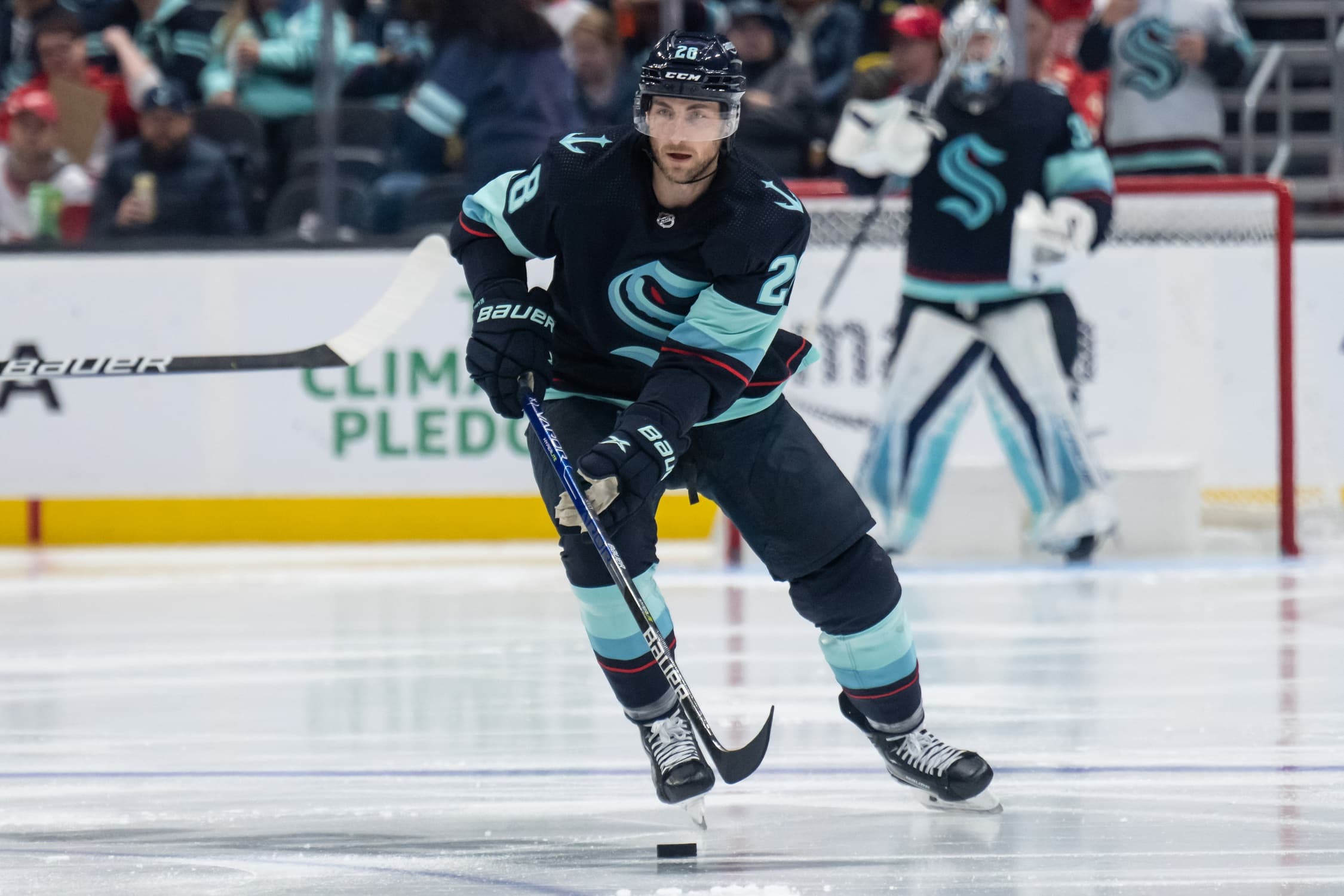Nation Sites
The Nation Network
CanucksArmy has no direct affiliation to the Vancouver Canucks, Canucks Sports & Entertainment, NHL, or NHLPA
Comparing the Vancouver Canucks’ recent free agency period to last season’s

Photo credit: © Stephen Brashear-USA TODAY Sports
Jul 4, 2023, 13:56 EDTUpdated: Jul 4, 2023, 13:55 EDT
Patrik Allvin and Co have their eyes on the prize. The Canucks didn’t cave into acquiring big names at both the 2023 NHL Entry Draft and the first day of free agency, although they still presented themselves quite handsomely. In free agency, in particular, they stuck to the game plan: tough, shot-blocking defencemen capable of killing penalties.
The Canucks not only managed to do that, but they found a solid fit in Teddy Blueger to centre a bottom six line. By the end of the first day of free agency, the Canucks had signed six players — three of those players expected to slot into the Canucks’ NHL lineup for next season. Defenceman Carson Soucy (three years, $3.25 million AAV), defenceman Ian Cole (one year, $3 million AAV), and Teddy Blueger (one year, $1.9 million AAV).
With the additions of Soucy and Cole, the Canucks’ blueline is pretty much solidified for the start of the season, minus the left side of the third pairing. In all likelihood, we’re looking at a Hughes-Soucy pairing and a Cole-Hronek pairing: a vastly better top six than seasons prior. That leaves Myers on the right side of the third line with a couple different AHL options: Christian Wolanin, Jack Rathbone, or free agency signing, 35-year-old and BC-born Matt Irwin.
Free agency has been relatively calm in the past two seasons that Allvin has been at the helm. The team has managed to nab a few eye-turning pickups like Andrei Kuzmenko, but for the most part, have targeted players like Curtis Lazar and Dakota Joshua to make the team tougher in the bottom six.
The Lazar deal, which looked excellent on paper last season, didn’t turn out. Unforeseeably, Lazar got injured and was later dealt to the New Jersey Devils for a fourth-round pick in next year’s draft. However, because Lazar was only a one-million-dollar investment, he didn’t break the bank.
This time around, the Canucks signed Blueger, Lazar’s replacement, to a one-year $1.9 million AAV deal. A little more expensive, but a better move overall. Lengths of contracts have ended up being the back-breaker for the Canucks. Year after year, the team worked to get themselves freed from a long-time contract, just to commit themselves to another right away.
In this free agency, the Canucks’ longest contract was a bridge deal with Soucy, as both Cole and Blueger were brought on for the season and will need to play for future contracts. However, the Canucks are still in a bit of a bind as Soucy has a no-trade clause for his first two seasons, and then a 12-team trade list in his final year. Meaning, the Canucks are basically glued to Soucy for two seasons.
While that’s a bit of a concern, it’s nowhere near as bad of a situation as the whole Oliver Ekman-Larsson fiasco was. Much like Rutherford’s Penguins, which Allvin was a part of, the team is allocating their big bucks to locking down their core players for the long run. They aren’t interested in shelling out money to support players. Canucks management would much rather see how those players do on a one-year contract to give themselves an option at the end of the season to part ways. If a player fits well, you look to re-sign them. But, if they don’t fare well, no harm, no foul. You let them go.
This was the disciplined approach the Canucks have been missing. Previous regimes have gone all-in to try to solve all of the Canucks’ problem areas in one go with long-term contract solutions — only ending up exacerbating the problems further. This one-and-done approach was the Canucks demise.
From what we’ve seen from Allvin, particularly this season, the Canucks aren’t interested in selecting the best players available. They’re strictly addressing needs and transforming the backend of the lineup to consist of workhorses that can create time and space for the topline, block shots, kill penalties, and hit. For so long, the Canucks focused on finding long-term talent to propel the team forward, and when they started to find it, they just never stopped: fully neglecting the backend and the bottom six.
Allvin’s moves have consistently demonstrated that’s not the team’s M.O. anymore. They’re finding role players and tough veteran presences in their blueline without breaking the bank, and tying them down to a player for too long. The Canucks would much rather do that than erase all the work they’ve done to buy out Ekman-Larsson’s contract.
If one-year contracts mean more work during free agency, then so be it.
Breaking News
- Canucks GM Patrik Allvin talks Myers trade, Pettersson’s struggles, and more
- Scenes from morning skate: Lankinen starts, Mancini returns, and Kane questionable as Canucks host Hurricanes
- Canucks trade Tyler Myers to Dallas Stars for a pair of draft picks
- NHL trade rumours: What can the Islanders and Bruins each offer for Conor Garland?
- What does a good, bad, and ugly trade deadline look like for the Canucks?
